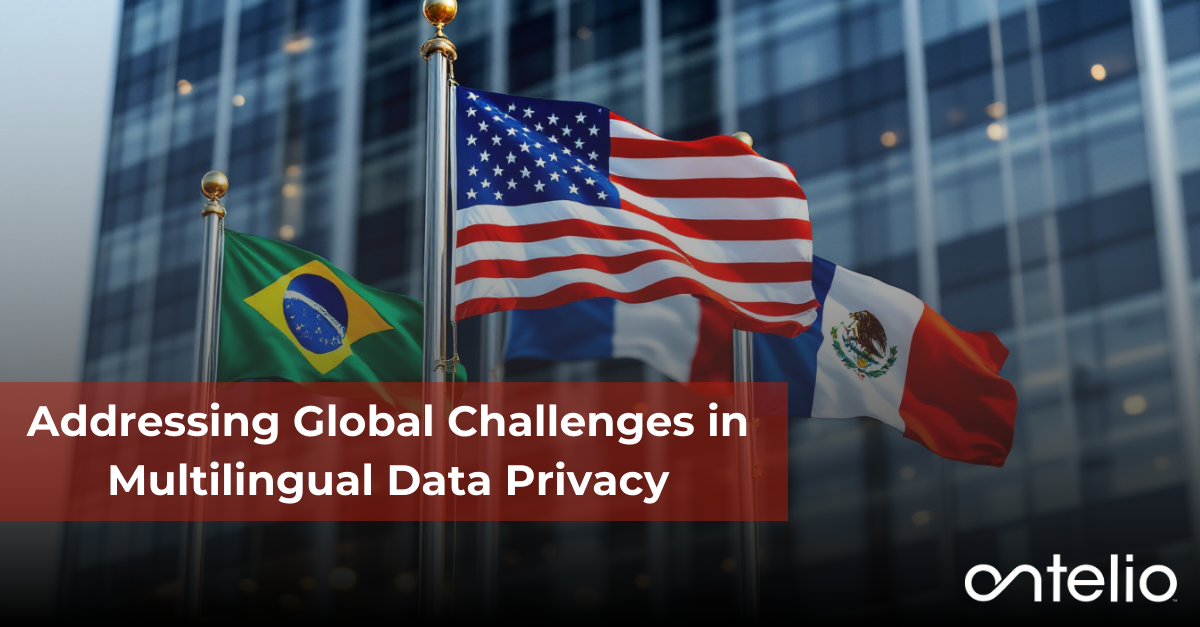Addressing Global Challenges in Multilingual Data Privacy
As organizations expand globally, the complexity of managing data privacy across multiple languages and jurisdictions intensifies. Contact centers...
22 min read
Marcel Fournier Jul 29, 2024 8:54:15 AM

The Federal Trade Commission's (FTC) intensifying scrutiny under its expanded 'unfairness' doctrine poses a pivotal challenge for Chief Information Officers (CIOs) and Chief Information Security Officers (CISOs) in the enterprise contact center industry. As we move into 2025 and 2026, this shift marks a significant departure from the FTC's traditional enforcement strategy, which focused on overtly deceptive practices. Now, the FTC is casting a wider net, targeting practices that may not be explicitly deceptive but are deemed inherently unfair to consumer privacy and data security. This proactive stance reflects the FTC's commitment to evolving with the digital age, ensuring that consumer rights are at the forefront of technological advancement and corporate accountability.
For CIOs and CISOs leading the charge in large enterprises, this development is not just a compliance issue but a strategic concern that demands immediate and innovative responses. The FTC's approach signals a future where the lines between fair and unfair practices in data privacy and cybersecurity become increasingly blurred, requiring a reevaluation of existing data management and protection strategies. This paradigm shift necessitates a more holistic and foresighted approach to data ethics and security, going beyond mere legal compliance to embed consumer trust and data integrity into the core of business operations. In this context, Ontelio's data redaction solution emerges as a pivotal tool. By intelligently identifying and redacting sensitive information across various data sources, Ontelio helps enterprises meet stringent privacy regulations, reinforcing the commitment to consumer privacy and data security in an increasingly scrutinized environment.
FTC's Enforcement Trends and Predictions for 2025 and 2026
Trends in State Data Privacy Laws
Trends in New Rulemaking Under Existing State Laws
Key Aspects of the EU-US Data Privacy Framework
Key Aspects of Emerging AI Regulation
Key Aspects of Increased Focus on Adtech and Consumer Privacy
Key Aspects of Stricter Regulations for Data Brokers
Trends in Health Privacy Beyond HIPAA
Key Aspects of Enhanced Protection for Children’s Online Data
Given these trends, enterprise contact centers must be vigilant and proactive in adapting their data privacy and security practices. The key areas of focus should include:
The FTC's increasing vigilance and the expansion of the 'unfairness' doctrine suggest a more aggressive stance on data privacy and cybersecurity. Enterprise contact centers must anticipate and adapt to these changes, ensuring compliance and protecting consumer data to avoid substantial penalties and legal challenges. This environment calls for a strategic approach to data privacy, where protecting consumer interests aligns with business practices.
In an era where data breaches and privacy concerns are escalating, Ontelio stands out as a significant solution for enterprises aiming to achieve and maintain compliance with stringent data privacy regulations. Focusing on Personally Identifiable Information (PII), Payment Card Information (PCI), and Protected Health Information (PHI), Ontelio delivers a robust and reliable data redaction system that is crucial for organizations navigating the complex landscape of data privacy laws.
With the rise of stringent data privacy regulations like GDPR and CCPA, the management of PII has never been more critical. Ontelio addresses this challenge head-on by providing an advanced data redaction platform. This system intelligently identifies and redacts sensitive PII from a vast array of data sources, ensuring that personal details such as names, addresses, and social security numbers are securely masked. This proactive approach not only safeguards consumer privacy but also positions enterprises ahead of compliance requirements, preventing costly penalties and reputational damage.
In financial transactions, PCI compliance is paramount. Ontelio technology excels in identifying and redacting payment card information, thereby mitigating the risks associated with data breaches. By automatically redacting card numbers, expiration dates, and CVV codes from transactional records and communications, Ontelio ensures that enterprises meet PCI DSS standards, securing customer trust and loyalty while avoiding financial and legal repercussions.
The handling of PHI is a critical concern in the healthcare sector, especially with regulations like HIPAA and HITECH in place. Ontelio solution adeptly identifies and redacts sensitive health information from electronic health records (EHRs), correspondence, and other digital mediums. This capability is instrumental in maintaining the confidentiality of patient data, an essential aspect of healthcare compliance. By automating the redaction process, Ontelio not only streamlines workflows but also minimizes the potential for human error, a critical factor in PHI data management.
Ontelio data redaction technology is not just a tool but a strategic asset for enterprises in their quest for compliance. By seamlessly integrating with existing systems and processes, it provides a layer of security and compliance that is essential in today’s data-driven world. Ontelio is not only protecting sensitive data but also preserving the trust and confidence of consumers and stakeholders, a priceless benefit in the modern business environment.
The surge in comprehensive state data privacy laws in the United States is a significant trend that is expected to continue and expand in 2025 and 2026. This trend is driven by several factors, including the slow progress of federal data privacy legislation, the increasing influence of AI in data privacy, and the desire for more specific laws that address emerging issues such as consumer health data and biometrics.
The evolving landscape of state data privacy laws has several implications for enterprise contact centers:
The landscape of state data privacy laws in the US is rapidly evolving, with a clear trend towards more comprehensive and specific regulations. Enterprise contact centers must be vigilant in understanding these changes, ensuring compliance, and preparing for the operational, legal, and technological challenges that these new laws present. The ability to navigate this complex environment will be crucial for the success and sustainability of contact centers in the coming years.
The trend of new rulemaking under existing state laws in the United States is a significant development in the data privacy landscape. This trend is driven by states like Colorado and California, which have been at the forefront of developing specific obligations for businesses under their data privacy laws. This movement towards detailed rulemaking is expected to spread to other states, influencing how enterprise contact centers handle data.
Enterprise contact centers must navigate these new state regulations, which involve detailed rulemaking and specific obligations in data handling. The implications include:
The trend of new rulemaking under existing state laws presents a complex and evolving challenge for enterprise contact centers. The key to successfully navigating this landscape lies in staying informed about state-specific requirements, enhancing transparency and data protection measures, preparing for increased legal risks, and ensuring compliance across various jurisdictions. Adapting to these changes will be crucial for contact centers to operate effectively and responsibly in the evolving data privacy environment.
The EU-US Data Privacy Framework (DPF), which replaces the Privacy Shield program, is a significant development for contact centers dealing with transatlantic data transfers. This framework establishes a new set of compliance obligations and mechanisms for lawful data transfers from the EU to the US. The DPF is crucial for ensuring that personal data from the EU is adequately protected when transferred to the United States.
The EU-US Data Privacy Framework represents a significant shift in the landscape of transatlantic data transfers. For enterprise contact centers, aligning with the DPF requirements will involve careful planning and implementation of updated data protection and privacy practices. Adherence to these new standards will be crucial for maintaining compliance, ensuring secure data sharing, and upholding the trust of both US and EU data subjects.
The emergence of AI regulation, particularly in the context of contact centers, is a critical trend as AI becomes more integral in operations such as data classification and redaction. The evolving regulatory landscape around AI use, highlighted by the EU’s AI Act and similar initiatives in the US, indicates a shift towards more regulated AI applications. This trend is expected to grow in 2025 and 2026, with an increased focus on compliance and enforcement.
The increased focus on adtech and consumer privacy is a significant trend influencing contact center operations, particularly in how they collect and use customer data for marketing or customer profiling. This trend is driven by the heightened scrutiny of adtech practices and a growing demand for transparency in the use of personal data in advertising. Let's explore the key aspects of this trend and its implications for enterprise contact centers.
The increased focus on adtech and consumer privacy presents both challenges and opportunities for enterprise contact centers. By embracing AI-driven solutions, adapting to new advertising channels, integrating e-commerce with advertising, prioritizing sustainability, focusing on mobile advertising, ensuring compliance with privacy regulations, and leveraging data for targeted campaigns, contact centers can effectively navigate this evolving landscape. This approach will not only enhance customer experience but also ensure that contact centers remain competitive and compliant in an ever-changing digital advertising environment.
The increasing attention on data brokers is leading to predictions of stricter regulations in the near future, particularly in 2024. This focus is driven by concerns about the collection, sale, and use of consumer data by data brokers, often without the consumers' knowledge or consent. Let's explore the key aspects of this trend and its implications for enterprise contact centers.
The trend towards stricter regulations for data brokers will significantly impact enterprise contact centers, particularly those handling third-party data or involved in data brokerage. Contact centers must be proactive in adapting to these changes, ensuring compliance, protecting consumer privacy, and preparing for the operational, legal, and technological challenges that these new laws present. Being vigilant and responsive to these regulatory developments will be crucial for contact centers to operate effectively and responsibly in the evolving data privacy environment.
The focus on health data privacy, particularly for data generated outside traditional healthcare settings, is a growing concern. This shift has significant implications for contact centers handling health-related data, especially in the context of compliance with state laws like Washington’s My Health My Data Act and beyond HIPAA (Health Insurance Portability and Accountability Act) requirements.
The growing focus on health privacy beyond HIPAA presents new challenges and responsibilities for enterprise contact centers. Adhering to these evolving regulations and consumer expectations is crucial, requiring enhanced security and privacy measures, regular training, effective breach notification processes, and compliance with both HIPAA and additional state laws. This approach ensures the protection of sensitive health information and maintains the trust of consumers in an increasingly digital healthcare environment.
The growing emphasis on children’s online privacy has led to significant proposed updates to the Children’s Online Privacy Protection Act (COPPA). This trend reflects increasing public and regulatory concern over online data collection of children’s personal information.
The proposed updates to COPPA reflect a significant shift towards enhanced protection for children’s online data. Enterprise contact centers that interact with or collect data from children will need to be vigilant in adapting to these changes. Compliance with these regulations will involve revising data handling practices, enhancing transparency, revising consent mechanisms, and making necessary technological adjustments. By doing so, contact centers can ensure they protect children's online privacy while maintaining compliance with evolving regulations.
The Securities and Exchange Commission (SEC)'s increased activity in requiring detailed cybersecurity disclosures from public companies is a significant development that will indirectly impact contact centers, especially those affiliated with or servicing public companies. In July 2023, the SEC adopted new rules that significantly affect how public companies disclose material cybersecurity incidents and manage cybersecurity risks.
The new SEC cybersecurity disclosure requirements signify a major shift in the regulatory landscape, placing greater emphasis on timely and detailed reporting of cybersecurity incidents and governance. For enterprise contact centers, especially those linked to public companies, adapting to these changes will be crucial. This adaptation involves enhancing cybersecurity measures, aligning reporting practices with new standards, and being proactive in managing and disclosing cyber risks. These developments underscore the increasing importance of cybersecurity in the corporate governance and regulatory compliance landscape.
In conclusion, the expanding landscape of data privacy and cybersecurity regulations, characterized by the FTC's revised 'unfairness' doctrine, evolving state laws, and international frameworks, presents significant challenges and opportunities for enterprise contact centers. Adaptation and proactive compliance are crucial, necessitating enhanced data protection strategies, transparency in AI and adtech practices, and stringent cybersecurity measures. Ontelio emerges as an invaluable tool in this scenario, offering robust data redaction capabilities that align with these regulatory shifts. This ensures Ontelio is not just a compliance solution, but a strategic asset for enterprises committed to safeguarding consumer data and maintaining trust in this rapidly evolving digital landscape.

As organizations expand globally, the complexity of managing data privacy across multiple languages and jurisdictions intensifies. Contact centers...

4 min read
In today's business landscape, marked by an increasingly data-centric approach, the role of the contact center has evolved into a pivotal bridge...

In the age of AI and data-driven insights, businesses face the dual challenge of leveraging vast amounts of data for customer experience (CX)...